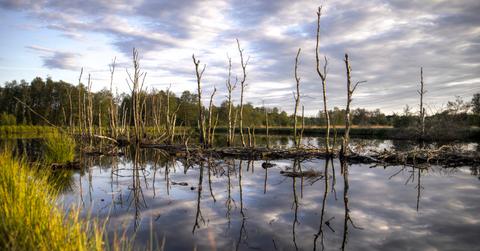This City Processes All Of Its Sewage Through Its Unique Wetlands
A city in India has had a system in place for purifying millions of gallons of waste every day into clean water and fertilizer for fish and plants. The old system is being threatened by encroaching real estate markets.
Updated May 25 2019, 4:24 p.m. ET
Kolkata is a bustling city in the West Bengal State in India, and is home to around five million people. Though it's definitely a metropolis, there is not a single sewage-treatment plant. The India Better reports that the city produces 2 million gallons of wastewater and sewage every single day, but the city hasn't been flooded with waste. That is because they use the natural filter of their local wetlands to filter and clean the water.
The East Kolkata Wetlands were original salt marshes and other low-lying lands that would naturally flood during the rainy season. They have been built up into a man-made network that processes waste through the ecological structure of the marsh itself. A local corporation routs the waste water through small inlets, which are each managed by a different fishery cooperative. The cooperative manages the water's flow, which allows the waste to settled to the bottom, and the clear water to flow out into the wetland.
A fish gate keeps the aquatic animals out of the waste water, where they would die for lack of oxygen. Meanwhile, the soil bacteria, macro-algae, plant bacteria, and the actual plants are breaking down the pockets of nitrate, and absorbing phosphate and heavy metals in the waste. Again, the clear water separates, and the other materials, mostly harmless sediment, lowers to the water floor. This is called bio-mediation.
It takes about 20 days for this process to clean water, but it leave the liquid extremely nutrient rich. It is then used by the fisheries to feed fish and algae in small ponds, called bheries. It can also be used in the vegetable growing cycle, particularly along water banks. The wetlands themselves also help to control flooding in Kolkata, which is vulnerable during monsoon season, as it's close to the Gangetic delta.
There is considerable pressure in Kolkata to disturb this clean and efficient practice as the real estate market ramps up. Developers want to fill in the bheries and build on top of them. Some have done so illegally, and been accused of sabotaging local fisherman who work within the ecosystem's chain.
The silver lining is that the wetlands have grabbed the attention of scientists and researchers who believe this unique solution to sewage could be used elsewhere, and recommended wetland designs in four other towns in West Bengal. The Wetlands show that sometimes old solutions are potentially the best ones.
